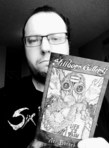Axl Barnes's Blog, page 9
July 26, 2013
My top 10 Richard Laymon novels
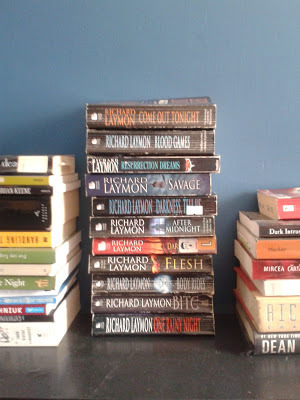 My small Richard Laymon Collection. I'm a big
Richard Laymon
fan. I've read more than half of his novels and I look forward to devouring the rest. Here's my top 10 list so far. Warning: book impressions contain spoilers.
1. "The Traveling Vampire Show"
My small Richard Laymon Collection. I'm a big
Richard Laymon
fan. I've read more than half of his novels and I look forward to devouring the rest. Here's my top 10 list so far. Warning: book impressions contain spoilers.
1. "The Traveling Vampire Show"
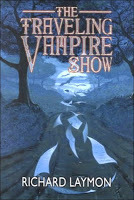 The book follows three 16-year olds on an idle summer day. Dwight, Slim and Rusty find fliers for an exotic vampire show coming to their town. The show features Valeria, the world's only living captured vampire. Slim, a feisty tomboy, is attracted to Dwight. Rusty, overweight and perverse, is tired of screwing his younger sister and dreams of nailing Valeria. Will he succeed? The book is a beautiful blend of Bradbury`s Something Wicked This Way Comesand Twain`s The Adventures of Huckleberry Finn. It also echoes Stephen King`s It. However, the final product bears the mark of its author, the master of the grotesque, the supreme perv, the world`s sickest writer, Richard Laymon.
The book follows three 16-year olds on an idle summer day. Dwight, Slim and Rusty find fliers for an exotic vampire show coming to their town. The show features Valeria, the world's only living captured vampire. Slim, a feisty tomboy, is attracted to Dwight. Rusty, overweight and perverse, is tired of screwing his younger sister and dreams of nailing Valeria. Will he succeed? The book is a beautiful blend of Bradbury`s Something Wicked This Way Comesand Twain`s The Adventures of Huckleberry Finn. It also echoes Stephen King`s It. However, the final product bears the mark of its author, the master of the grotesque, the supreme perv, the world`s sickest writer, Richard Laymon. 2. "Savage"
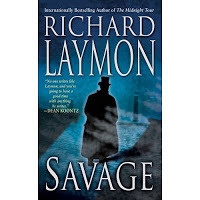 Trevor Bentley, a courageous lad from London, chases Jack the Ripper from Whitechapel to the Wild West. The notorious murdered decides to go to America in order to learn torture techniques from the natives. Following the killer's blood trail, Trevor meets Jesse, a wild tomboy. The love-story is very romantic, as romantic as you can find in a champion of splatterpunk. But will Jesse end up getting raped and carved up by Jack the Ripper? Or will he just scalp her, cut off her tits and let her go?
Trevor Bentley, a courageous lad from London, chases Jack the Ripper from Whitechapel to the Wild West. The notorious murdered decides to go to America in order to learn torture techniques from the natives. Following the killer's blood trail, Trevor meets Jesse, a wild tomboy. The love-story is very romantic, as romantic as you can find in a champion of splatterpunk. But will Jesse end up getting raped and carved up by Jack the Ripper? Or will he just scalp her, cut off her tits and let her go? 3. "Funland"
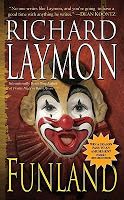 This novel has so many things going for it. It`s about teenagers torturing hobos. It`s about mutants and circus freaks. Tanya`s not a happy camper. He got raped by three hobos, some of the many crawling around the Funland Amusement Park. As if that humiliation wasn`t enough, the rapists also cut her up and pissed on her. Now, Tanya is the leader of a group of youngsters who fight the trolls. They torture and kill hobos under the cover of night. But her quest for revenge takes beautiful Tanya and her crew into Jasper Dunn`s lair. The old perv owns Funhouse and Jasper`s Oddities -- a place crowded with freaks of nature like two-headed people and gigantic spiders and such. Is Tanya going to survive or will she get stung again? Will Jasper Dunn manage to eat her up?
This novel has so many things going for it. It`s about teenagers torturing hobos. It`s about mutants and circus freaks. Tanya`s not a happy camper. He got raped by three hobos, some of the many crawling around the Funland Amusement Park. As if that humiliation wasn`t enough, the rapists also cut her up and pissed on her. Now, Tanya is the leader of a group of youngsters who fight the trolls. They torture and kill hobos under the cover of night. But her quest for revenge takes beautiful Tanya and her crew into Jasper Dunn`s lair. The old perv owns Funhouse and Jasper`s Oddities -- a place crowded with freaks of nature like two-headed people and gigantic spiders and such. Is Tanya going to survive or will she get stung again? Will Jasper Dunn manage to eat her up?4. "Resurrection Dreams"
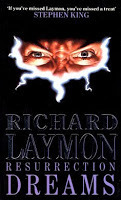 A masterpiece with an unforgettable character, Melvin Dodds. Melvin was the biggest creep in Ellsworth High. For a science project, he dug up a girl's fresh body and attempted to bring it back to life with the aid of a battery car. The experiment failed, but his obsession didn't stop. Back from the loony bin, Melvin gives black magic a shot. And it works. The nurse he recently killed is brought back to life. She becomes his sex slave. The only downside is that she is too ferocious in bed; she bites real hard. She's also very needy and annoying. Melvin considers getting rid of her and of other zombies he animated for his own selfish and twisted purposes. But how can you kill what is already dead?
A masterpiece with an unforgettable character, Melvin Dodds. Melvin was the biggest creep in Ellsworth High. For a science project, he dug up a girl's fresh body and attempted to bring it back to life with the aid of a battery car. The experiment failed, but his obsession didn't stop. Back from the loony bin, Melvin gives black magic a shot. And it works. The nurse he recently killed is brought back to life. She becomes his sex slave. The only downside is that she is too ferocious in bed; she bites real hard. She's also very needy and annoying. Melvin considers getting rid of her and of other zombies he animated for his own selfish and twisted purposes. But how can you kill what is already dead? 5. "Blood Games"
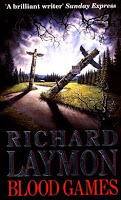 Five young women, best friends since college, meet every year in search of fun and thrills. This year is Helen`s turn to choose a location for their reunion. Slightly sick and twisted, Helen chooses the Totem Pole Lodge, a deserted resort deep in the woods. Years ago, many people had died there under bizarre circumstances. Something to do with a tribe of cannibals. Needless to say, Helen`s choice proves disastrous.
Five young women, best friends since college, meet every year in search of fun and thrills. This year is Helen`s turn to choose a location for their reunion. Slightly sick and twisted, Helen chooses the Totem Pole Lodge, a deserted resort deep in the woods. Years ago, many people had died there under bizarre circumstances. Something to do with a tribe of cannibals. Needless to say, Helen`s choice proves disastrous. 6. "Come out, tonight"
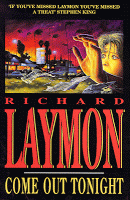 Another legendary character, Toby Bones. Toby has the hots for his English teacher, Sherry Gates. But he doesn't stop at masturbating over her, like a normal teen would. Oh, no! That's not how Toby does things! No way! What he does is he kill and eats parts of Sherry`s boyfriend, poor Duane, and then rapes, beats and bites Sherry savagely, leaving her for dead in the wilds. But you know what? Even that doesn`t satisfy Toby`s primal needs. Next, he decides to go after Sherry`s younger sister, Brenda, who is closer to his age and probably tighter. Hopefully a virgin.
Another legendary character, Toby Bones. Toby has the hots for his English teacher, Sherry Gates. But he doesn't stop at masturbating over her, like a normal teen would. Oh, no! That's not how Toby does things! No way! What he does is he kill and eats parts of Sherry`s boyfriend, poor Duane, and then rapes, beats and bites Sherry savagely, leaving her for dead in the wilds. But you know what? Even that doesn`t satisfy Toby`s primal needs. Next, he decides to go after Sherry`s younger sister, Brenda, who is closer to his age and probably tighter. Hopefully a virgin. 7. "Body Rides"
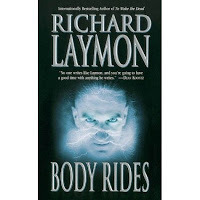 In exchange for (temporarily) saving a woman's life, Neal receives a special bracelet. A bracelet which enables its owner to leave his body and travel inside other people's minds. This opens a world of possibilities for Neal. Having sex with someone while you are in their mind. Letting someone else ride your body. Visiting random people just to see what's it like to be them. You know, kinda like that movie Being John Malkovich.
In exchange for (temporarily) saving a woman's life, Neal receives a special bracelet. A bracelet which enables its owner to leave his body and travel inside other people's minds. This opens a world of possibilities for Neal. Having sex with someone while you are in their mind. Letting someone else ride your body. Visiting random people just to see what's it like to be them. You know, kinda like that movie Being John Malkovich. There are some problems though: what if your host dies while you are inside? Will you get trapped into their dead body like in a cage for all eternity? Or what if someone kills you while you're away on a body ride? Can you came back? Or will you just wonder around aimlessly? Or what if someone wants to kill you but you don't remember where you put your fucking bracelet?
8. "Darkness, Tell Us"
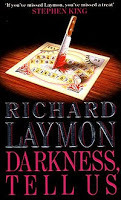 Angela isn't a happy camper. Growing up, she was repeatedly raped and tortured by her step-dad and step-brothers.The men used to live in a van, driving around in search of new sexual extreme adventures. You know, just living the American Dream. Now, having escaped her tormentors, Angela needs to sell her body to get through college. Since tuition and housing are not cheap, she basically sells herself into slavery. Her landlord, a foul-mouthed, hunchbacked, stinky old men, likes to tie her up naked in the closet and whip her now and again, when tired of screwing her on the dirty mattress in her, otherwise empty, room. To her surprise, Angela's dead mother gets in contact with her and some of her college friends, through a Ouija board. By promising them access to a lost treasure, the ghost facilitates Angela's revenge.
Angela isn't a happy camper. Growing up, she was repeatedly raped and tortured by her step-dad and step-brothers.The men used to live in a van, driving around in search of new sexual extreme adventures. You know, just living the American Dream. Now, having escaped her tormentors, Angela needs to sell her body to get through college. Since tuition and housing are not cheap, she basically sells herself into slavery. Her landlord, a foul-mouthed, hunchbacked, stinky old men, likes to tie her up naked in the closet and whip her now and again, when tired of screwing her on the dirty mattress in her, otherwise empty, room. To her surprise, Angela's dead mother gets in contact with her and some of her college friends, through a Ouija board. By promising them access to a lost treasure, the ghost facilitates Angela's revenge. 9. "Flesh"
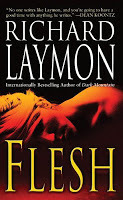 A slimy, slithering ....thing arrived in town, probably from outer space. It has dull eyes and a hideous mouth. It likes to burrow into your brain and turn you into a beast, a killer, a rapist, a new Ted Bundy. 'Nuff Said!
A slimy, slithering ....thing arrived in town, probably from outer space. It has dull eyes and a hideous mouth. It likes to burrow into your brain and turn you into a beast, a killer, a rapist, a new Ted Bundy. 'Nuff Said! 10. "Cuts"
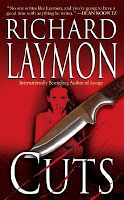 Albert Prince doesn`t know how to fuck a woman. What he does is he cuts her belly with a knife, and sticks himself in the wound. Then he pumps the bloody hole till he's done. Will Albert find out how sex really works? And how many women will get mangled in the process?
Albert Prince doesn`t know how to fuck a woman. What he does is he cuts her belly with a knife, and sticks himself in the wound. Then he pumps the bloody hole till he's done. Will Albert find out how sex really works? And how many women will get mangled in the process?
Published on July 26, 2013 12:47
April 7, 2013
Profit over Education in Alberta
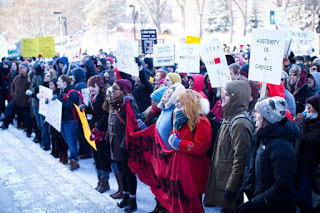 This year, universities and colleges in Alberta became the target of a brutal assault by the Provincial Conservative Government. These post-secondary institutions face 20% budget cuts as well as pressure to restructure and better contribute to the province's economic growth, by becoming part of the nightmarish vision called
Campus Alberta.
In a letter to universities across the province, Minister of Enterprise and Advanced Education, Thomas Lukaszuk, describes his vision for advanced education. It is meant to promote "lifelong learning" in Alberta students. It ensures a "skilled and productive workforce", excellence is "research, innovation and commercialization" and a "competitive and sustainable"economy.
This year, universities and colleges in Alberta became the target of a brutal assault by the Provincial Conservative Government. These post-secondary institutions face 20% budget cuts as well as pressure to restructure and better contribute to the province's economic growth, by becoming part of the nightmarish vision called
Campus Alberta.
In a letter to universities across the province, Minister of Enterprise and Advanced Education, Thomas Lukaszuk, describes his vision for advanced education. It is meant to promote "lifelong learning" in Alberta students. It ensures a "skilled and productive workforce", excellence is "research, innovation and commercialization" and a "competitive and sustainable"economy. I hope that this attempt at transforming public advanced education into a training ground for major corporations will be met with fierce public resistance. I hope students and profs in Alberta will be inspired by the Quebec student movement in 2012, which was so massive and relentless that it triggered provincial Elections and the rejection of Jean Charest's Liberal Provincial Government.
Like in Quebec, our provincial government's declaration of war on education should give rise to a public debate about the role of education. (See my earlier post " On the Quebec Student Strike" )
By this I don't mean a conversation taking place between a few dusted academics and chameleonic politicians behind the closed doors of the Legislature or on some secluded resort in the Canadian Rockies.
No! We have had enough petty, meaningless negotiations.
A real public conversation takes place in the agora and during the deliberation all public institutions should stop running. One can't deliberate whether to take out the trash while taking out the trash. One should stop in order to think. Similarly, the universities should stop in order to think. The government should stop in order to think.
This halting of operations is achieved by massive protests, people flooding the streets and paralyzing the city.
In a period of economic dictatorship any abrupt cessation in the operations of an institution, be it public or private, is seen as anathema. When the workers of Canada Post, Air Canada, and Canadian Pacific Railway went on strike, the Harper Government promptly introduced back-to-work bills. In inverted totalitarianism, the absolutist regime inherent in unfettered capitalism, strikes and other public protests are opposed with two arguments: they affect the economy and they endanger public security. This only shows how poorly capitalism fits with democracy and the process of democratic deliberation.
These difficulties aside, the main question shaping a genuine conversation about education should be: what's the role of education in general and post-secondary education in particular? or, What's the good of education?
Capitalism is characterized by the use and abuse of instrumental thinking. In the capitalist's relentless search for profit, everything becomes a commodity, something which can be sold on the market. Everything becomes a means to an end: making more money or economic growth.
In modern-day capitalism, education and knowledge have also became commodities. What we witness is a gradual shift in our thinking about education: education is now an investment, it is choosing a career, building a base for the rest of your life. You have to pay for it and hope to God it turns a profit. Purchase it, become a product, join the workforce, and sell yourself. In spite of the good associations the phrase "lifelong learning" triggers in our minds, there is nothing noble about what Minister Lukaszuk means by it. It just means that if you buy education and find yourself unemployed you'll have to be willing to buy moreeducation. That is, do more training, develop new skills. You're never too old for consuming education. You can consume it till you die.
The educational system thus becomes a mechanism turning people into products to be sold on the slave market. That is, the workforce.
This catastrophic outlook is an outcome of abusing instrumental thinking; an abuse internal to the logic of capitalism.
This is why it's worth reminding ourselves why we value education in the first place and what sort of good it was taken to be. Many of the things listed below will sound familiar, if not tired and preachy, but the goal of enumerating them is recalling the initial framework of thought about education. And guarding ourselves against the capitalist attempt to hijack and transform the concept.
Education is a good in itself which can also have instrumental value. However, it is always more than its instrumental value. We value someone being knowledgeable or lucid even if his knowledge has no immediate practical application. For instance, we respect someone for knowing ancient history or having a good command of Latin, even if this knowledge doesn't turn a profit. We appreciate someone who's able to think critically about social and political issues even if he happens to be the garbage man or the plumber.
These are qualities which define humans as a species and exercising them is good in itself. Education means expanding your mind, your consciousness, and reaching your full cognitive potential. It means being a full member of society, aware of your social and political responsibilities. It means having a civic and moral sense, being a guardian of civilization, history, and culture, and being able to think critically and participate in conversations regarding social problems in your community. This is whywe want people to be educated.
Notice that there's no mention of economic growth.
Someone might object: "Right, but what's wrong with addingeconomic growth to the picture? After all we want smart people to use their skills for the end of economic prosperity!"
Well, the danger of starting to speak in terms of economic growth is mutilating education by commodifying it. Moreover, in capitalism, the obsession with turning a profit makes people lose their humanity. Humanity becomes an inconvenience. Consciousness, autonomy and self-determination are things to be eliminated. So there is an intrinsic tension between the value of economic growth and the values which define education.
To make this point more vivid, let's take a closer look at the value of autonomy and individual freedom. Cognitive scientists and psychologists agree that our brains reach full maturity only at the age of twenty-one. That is, the frontal lobe which is the area responsible for decision-making and long-term planning is fully developed only after twenty. The individual is only then fully centered and ready to take on the responsibilities of an adult. Until then, the teenager only plays at being an adult and his experiments should take place under the adult supervision of parents and educators. (see Robert Sylwester's book The Adolescent Brain: reaching for autonomy)
But now, in capitalism, the teenager is expected to make career decisions and borrow substantial amounts of money for their education. So, these developing brains are expected to make life-decisions although it is proven that they can't.
But wait! This is not an accidental feature of capitalism. No! It's called marketing. Being an unreflective consumer of goods and services is the capitalist paradise. People working in advertizing are the first to point out that ads are aimed at our lower-level cognition, the type of cognition we share with non-human animals. They aim at triggering feelings of pleasure and security by astute manipulation of images, colors and sounds. The capitalist mode of production wants consumers to have the intellectual development of children for as long as possible. Like non-human animals, children are easy to manipulate. In capitalism, the stupider people are, the better.
Capitalism promotes subhumanity. It takes away the burden of consciousness and responsibility from man, and lets him wander naked in a fabricated Garden of Eden. A lost child sucking a lollipop at Disneyland.
Manipulating tender minds in such brutal ways also has life-long negative effects. As Noam Chomsky points out:
"Students who acquire large debts putting themselves through school are unlikely to think about changing society. When you trap people in a system of debt, they can’t afford the time to think. Tuition fee increases are a “disciplinary technique,” and, by the time students graduate, they are not only loaded with debt, but have also internalized the “disciplinarian culture.” This makes them efficient components of the consumer economy."
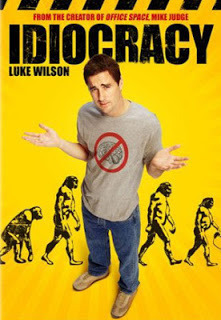 It follows that capitalism, as opposed to the way it is advertized by people like Bill Gates, is actually a war against brain development and leads to the evolutionary regress of the species. Capitalism is lobotomy practiced on a global scale, with the ice-pick of advertising. (An aspect captured nicely in the movie Idiocracy.) Capitalism will also lead to a historical and political regress, giving rise, as
Chris Hedges
suggests, to neo-feudalism. Both these hypotheses are worth considering seriously. But I don't think this is the type of research which leads to innovationor commercialization. It doesn't fit Lukaszuk's dark vision of the pursuit of knowledge. So, if you're a scholar interested in such outlandish issues like the history and future of capitalism or the effects of capitalism on human cognition, you'll have to learn how to conduct your research on an empty stomach.
It follows that capitalism, as opposed to the way it is advertized by people like Bill Gates, is actually a war against brain development and leads to the evolutionary regress of the species. Capitalism is lobotomy practiced on a global scale, with the ice-pick of advertising. (An aspect captured nicely in the movie Idiocracy.) Capitalism will also lead to a historical and political regress, giving rise, as
Chris Hedges
suggests, to neo-feudalism. Both these hypotheses are worth considering seriously. But I don't think this is the type of research which leads to innovationor commercialization. It doesn't fit Lukaszuk's dark vision of the pursuit of knowledge. So, if you're a scholar interested in such outlandish issues like the history and future of capitalism or the effects of capitalism on human cognition, you'll have to learn how to conduct your research on an empty stomach. Finally, let me consider a brief objection. I like to call it the "They took our Jobs!!!" Objection and I talked about it in previous posts: "Of Jobs and Blow-Jobs" and "Emil Cioran's Criticism of Work" . For some reason, I imagine a fifty-year old man, with a double chin, and blood-shot hysterical eyes making this objection. Let's call him Joe. Joe is a mechanic and his hands are big, dirty and rough. There's a deep crease in his brow when he frowns. He does frown as he makes his quick point: Education gets us jobs. Without jobs we die.
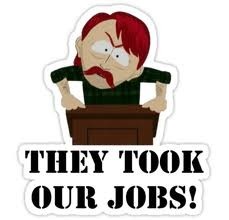 Let's take a step back and clear our minds. Do we actually want to work in the alienating and sordid jobs modern capitalism has to offer? And who says you either work or die? First, we don't value work in and of itself, but we value freedom and the capacity to live meaningful, happy lives. As
Bertrand Russell
argues in his famous essay "In Praise of Idleness", we value active leisure, doing what we want, as opposed to working for others.
Let's take a step back and clear our minds. Do we actually want to work in the alienating and sordid jobs modern capitalism has to offer? And who says you either work or die? First, we don't value work in and of itself, but we value freedom and the capacity to live meaningful, happy lives. As
Bertrand Russell
argues in his famous essay "In Praise of Idleness", we value active leisure, doing what we want, as opposed to working for others. But, Joe quickly points out, then we lose our jobs and can't pay our bills. And then we die, homeless and starved.
But wait a second Joe! This only speaks about the perversity of capitalism, the fact that it is institutionalized slavery. Large scale abuse of human beings. But, as history teaches us, we have to say no to slavery in all its forms. We have to rise up against it! Spartacus didn't say: Oh, we're slaves, but I guess that's ok cause it gives us a roof over our heads, a piece of bread, and some sex now and again, if we're lucky and win in the arena. No, he grabbed his sword and began butchering his masters. If someone says ''Do X or die!" you do your best to overpower him, if possible. You don't just tolerate that situation. And rejecting capitalism is surely possible, as world history teaches us.
I hope Joe likes Spartacus.
In this process of resistance and rejection of capitalism it is also important to recall general outlooks or attitudes we have towards life, which are not yet affected by the instrumental thinking of a mercantile spirit. One can feel a sense of wonder towards existence, a sense of gratitude and solidarity towards others. Values like love and friendship exist only against this background. And many things are good in themselves. Sex is good, although for prostitutes it can also turn a profit. Reading Shakespeare is good, even if you're not an English teacher and you don't want to become one. Playing sports is fun, even if you're not a professional athlete. Having a family is good, even if you don't plan on exploiting your wife and children and make them work in your factory or on your farm.
To sum up, a rational conversation about the role of education should start by recognizing the dangers of capitalist-instrumental reasoning. Then, it should heed new scientific findings about the development of the brain. One reasonable suggestion is making education public and mandatory till the age of twenty-one. Thus, rather than be trapped in a prison of debt, teenagers will learn how to be autonomous individuals, and have a civic sense. As a result, the educational system will give rise to genuinely free, rational individuals, rather than zombified consumers.
This is why, in response to the provocative actions of the Provincial Conservative Government, Albertans should take to the streets and fight this horrible incarnation of the spirit of unfettered capitalism. "Teachers and Students under Attack! What do we do? Stand up, fight back !!!"
Published on April 07, 2013 17:38
March 30, 2013
Adrian decides to kill (excerpt from "Ich Will")
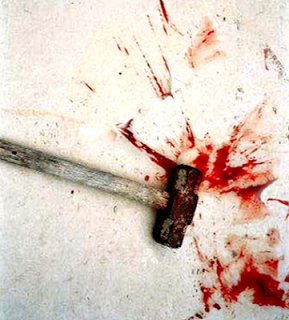 Stage Setting: Adrian Norton hates his MacDonnell's job, his manager Mike, and all of society. The only objects of his love are himself, libraries and ... the music of Rammstein.
Stage Setting: Adrian Norton hates his MacDonnell's job, his manager Mike, and all of society. The only objects of his love are himself, libraries and ... the music of Rammstein.____________________
"I left work at four in the afternoon, stopped at Mac's for cigarettes and then headed home. A thin, white envelope was taped on my door. It looked ominous. I opened it with trembling, violent hands. It was from my landlord. He wanted to increase the rent by 15%. He was offering a complicated economic argument about inflation in support of his decision. It was all very ridiculous. The increase would start at the end of May. If tenants decided to vacate they would have to inform him by the end of April.
They’re after me, my skeptical self said. They’re closing in.
Once inside the apartment I threw the letter in the garbage and collapsed in the armchair, my right hand massaging my temple.
I opened the new pack of Hollywoods, lit a cigarette and inhaled deeply.
The rent increase complicated things. Now, the fry-cook job seemed like a great job. But it was also an unpredictable one. Mike was unpredictable. Who knew what he’d come up with next? They’d always come up with new ways to humiliate me and study my reactions with sadistic, amused eyes. On the other hand, quitting and trying to find a new job was too risky. What if it took a few weeks or a month? Would I dip into my back-to-school fund? No, I rejected the thought immediately. Also, what if I hated the new job even more than MacDonnell's? Although the fry-cook job was crappy, I already knew how to do it, I was used to it. A new job would require a renewed effort of adaptation. Plus, I didn't want to fall into the habit of quitting jobs.
My mind went in circles like this for a long time. I felt like a polar bear that, in its desperate search for food, got lost in the frozen dark waters of the Arctic. Seeing a white small island of floating ice, he would swim towards it. He would put his large paws on it but the ice would break under his weight. Then, he would swim towards the next one, his limbs heavy, and his mind weak. But the new chunk of ice would also crumble. Seen from afar, the bear would be surrounded by never-ending waters, and only a dozen fragile, white floating islands. From that distance, the animal would look more like a mouse lost in the maze of a nightmare.
Like the bear’s paws, my mind measured the strength of different possibilities and its scrutiny made them crumble.
I suddenly stood up and felt light headed, dizzy. And the dizziness turned slowly into vertigo; it engulfed me like an avalanche. I sat back on the armchair, holding onto its sides with panicked hands.
Frowning, I looked at my watch and couldn't believe it was already six. I had been sitting there for two hours straight, trying to come up with an escape plan.
I also noticed I had smoked half of the pack of cigarettes. I’d smoked them one after another, lighting new ones from the butts of old ones, a nasty habit I had cultivated since middle school. I got a can of Boxer from the fridge, hoping that the cheap elixir would drown my pain. I chugged it and closed my eyes. I imagined the alcohol entering my blood stream and flooding my brain. Then, mechanically, I seized another one, chugged it, squeezed the empty can and threw it against the wall. My stomach churned and some of the bitter liquid came back into my mouth. I swallowed it again, willing it to stay down. The sudden intake of alcohol amplified my bad mood and turned my emotions into sharp, blind anger. It also made the present even more dangerous and oppressive, like a squid from a graphic novel which gradually comes to life and crawls out of the page right in front of your unbelieving eyes.
I was miserable and drunk.
Slowly but surely I realized all was lost. There was no way for me to redeem myself. Not in front of myself, at least; not in my own eyes. And, as I already said, I didn't care about redeeming myself in front of others. Take the episode when Mike showed me how to shake the fries container. How do I redeem that? Or helplessly watching my inferiors succeed in areas that were rightfully mine? These experiences stung a bit at first, but the incubator of my mind would soon turn them into venomous black snakes with a deadly bite. Instead of throwing them away like garbage, my brain would put them under the magnifying glass. There I was, stuffing fries in the red, carton container. When full, I would shake it a bit for good measure. Mike would smile at me, pleased that I obeyed his will. I was just a complicated, well-programmed, automaton under his command; a domesticated, well-trained, zombie; a toothless peasant. Why was I put on God’s green earth, you might ask? Oh, to offer people fries and shake them before I do it. Yes, that was my job. Sure, other people build rockets and study science, technology, art or philosophy. Others write novels or make archeological discoveries and analyze them on The History Channel. Yet others break records at the Olympic Games or release perfect musical albums. Others, but not me. No sir. I’m an expert in shaking this fat, red container with fries, in masturbatory fashion. That’s my line of work, what I was born to do. My passion is serving the customer. I’m very much into it 24/7.
I looked at my hands again, saw the fries container and felt Mike’s infectious touch.
He grabbed the container with his fat fingers and started shaking it.
But wait, those weren't fries! No, the yellow sticks were carefully sliced and fried sections of my brain. His crude fingers were touching my intimate nerves, the holy place of my identity. They were playing with my sacred tissue, ripping apart my ideas, my memories, my imagination—his fat, greasy, alien hands.
The troubling image came to my mind repeatedly. I tried to push it aside but then it would pop up again. My brain felt like a broken digital device, an out-of-control camera spitting bizarre pictures in response to basic commands.
More terrifying was the understanding that these vivid memories would show up in my recurrent nightmares. They would make copies in my brain and tirelessly combine in hideous new ways. They would live there like a nest of flies, lying eggs, buzzing around and sucking on my brain tissue with their hairy tubes.
Sitting there on my armchair, I felt doomed. It was a feeling that normally came at night, but now it paid me a visit in the early evening. The pallid sun rays made it more real. My tired brain concluded that my life could only be a downward spiral of humiliation, compromise and self-deception. Unfortunately, I was all too familiar with the voice of deception; I knew its intonation, its rhythm, its grammar and style. Its magic wouldn’t work even if my brain were soaked in alcohol. Moreover, my skeptical self pointed out, even if things go my way and I manage to go back to school in a year or two, I’ll still be tainted, worn out, scarred. My accomplishments can only be second hand outfits meant for the meek and the poor. It was too late now. The damage was done.
The thought that I’d work at MacDonnell's for at least one more year came to me. Two years of my life would be associated with Mike. At least two years. How did that scumbag become a central actor in my play? On my own stage? Sadly, I realized that I couldn't ignore him without ignoring my own life and my own self. I couldn't look away from him and think of something else. How did it come to this? My vision was trapped forever, attracted by his disgusting being like a magnet. And you know why? Because the hand feeding me was his. Driven by the basic need to survive, I was eating from his hand. I was like Whiskey, the wiener dog, desperate to feed and blind to the pins and razor blades stuck in the chunks of meat. The survival instinct made me Mike's slave.
Coiled by a tentacle of disgust, I felt like the only way to stay alive was to participate in an orgy with morbidly obese, handicapped, old, and senile people. It would be a decayed orgy of dying lips, dry popcorn farts, whizzing breaths through oxygen masks, wrinkled skins, sightless hungry eyes and fermented semen. But yes, that was the nasty hand I’d been dealt.
This was the orgy assigned to you, sir, the game show host said, looking at me over the glasses fixed on his nose, trying to keep a straight face. You’ll be stuck with it forever so you might just as well make the most of it and try to enjoy it. Good luck with it, dear sir.
Suddenly I couldn't breathe. What is this? Why did it come to this?My brain thought in the claws of panic and vertigo set in again. My room started spinning wildly.
Then I was still, still like an unfortunate victim who, after twisting and turning in a coffin, finally realizes that she was buried alive. She stands still as if anticipating rigor mortis. My desperate mind formed two ideas almost at the same time, breaking my full paralysis—two logical ideas.
The first one was that I didn’t have to accept the deal. After all, my high school and first three years of university had been pretty good. I lived them as if they were leading to higher, grander achievements, but now I saw they were good in and of themselves. That's what Napoleon must have felt while exiled on the island of Elba, contemplating his great victories, frantically searching their hidden meanings. I remembered reading Kafka for the first time in my dad’s den, which slowly became my sanctuary. The late afternoon sun was leisurely caressing the books covering the wall in front of my armchair and the yellow, crusty pages of the old volume in my hands. The narrative infiltrated my brain like a drug. Time dilated and then came to a full stop. It seemed I would be there forever, trapped under its spell, and that was okay by me. While my eyes were dreaming the story, my nose was absorbing the thick, musty, magical smell of the book—the smell I would come to associate with hot summer days. The back of my mind registered the shouts of other young boys playing soccer on a field across the street from our house—the other boys, the stillborns.
I recalled how afraid I was after reading Crime and Punishment. I had gone out for a walk to clear my head and almost got hit by a car because my mind was still pulsating in the frantic rhythm of the hypnotic story. Oh, and studying the rigorous imperatives of Kantian ethics always made me feel like I had the divine power to judge others, to judge humanity itself. There were many happy moments I looked forward to reliving. I didn’t have to take the rest of it, to hell with the rest. Adult life is pointless torture. My childhood, what I remember of it, was quite happy; I had enjoyed scoring goals in soccer games, dribbling and making long passes and shooting the ball from impossible angles; I loved skating and playing hockey in the winter and street hockey in the summer, with the crazy twins, Dave and Curtis, who were always cursing at each other; I liked playing chess with my dad, riding my bike as fast as I could down the street and eating lots of cookies made by my grandmother—and crepes and pancakes, yes, thick pancakes with strawberry jam were the best.
I indulged in nostalgia for a few more minutes and then focused my mind on a more practical idea. My enemies didn’t know about the Eternal Return. They didn’t know this life will repeat again and again throughout eternity. They had no idea how high the stakes were. Their ignorance gave me an advantage: the element of surprise.
Quickly, my mind fit these insights together like two Lego pieces. If I reject the deal, I might as well do some damage first, go down swinging. Things couldn't get any worse, so I had nothing to lose. Furthermore, I would die in control of my destiny and would thus create one last happy memory. I would go out with a bang, giving my life the ending of a good old Shakespearian tragedy.
The ideas electrified me and I started talking to myself, trying to build my confidence.
I’m still in control. Yes, yes, control. I can change the future without them knowing. Things can still go my way. I’m still the master of my own destiny. Still the master.
I started pacing again and repeating the statement, things can still go my way, like a magical formula. I began laughing hysterically and then, abruptly and for no logical reason, I felt infinite pity for myself and started crying. Oh, I suffered so much, I whined, tears covering my face and spittle dribbling from my mouth. Oh, poor me, how much I suffered. I’m so lonely.
Suddenly, I heard a deep, sinister voice coming from everywhere: Ich Will! Ich Will! The floor pulsated rhythmically as if in the grips of horror.
The incantation became louder and louder. I didn't know whether or not it was my voice.
Without thinking about it I started marching, military-style, to the rhythm of the song. In the middle of the room I stopped and looked up at the ceiling. I pressed my right hand on my heart and then pointed it upwards shouting “Heil Hitler!” I repeated the gesture numerous times. I can swear now that, in that moment of almost mystical excitement, I saw the severe face of the Führer taking form like graffiti painted on the ceiling by an invisible hand. It was a bit fuzzy because of all the smoke in my room. But I saw the short black hair carefully combed to the left, his large forehead and powerful nose and his famous toothbrush moustache. His eyes were so focused they seemed to burn my face. The imperatives hidden in those eyes pressed on me like dark walls. The bare light bulb hanging from the ceiling seemed to grow from his forehead like a third eye, its stare dazzling. I looked up at the apparition in horror and awe. I kneeled down on the carpet and lifted my hands up as if in prayer. His lips weren't moving but his mind spoke to me. It spoke to me clearly.
Exterminate to survive! Kill Mike the Merchant! Eliminate the Merchant!
Protect your Lebensraum.
I accepted this immediately, like someone who sees the truth of 2+2=4.
Yes, Master, I murmured through salty tears. Yes, Master.
Then the image disappeared and I sat down on the floor, heart racing, both happy and terrified at the vision. I felt I was about to do what I should have done for a long time. The course of action was clear.
My mind was made up and I was relieved, able to breathe again.
What felt like the weight of the world had been lifted off my chest.
Smiling, I crawled into bed and hugged the blankets with all my strength, like a woman dreaming of her lover.
Soon, the logical side of my psyche reeled its head, spitting gas on my fired will. Although my parents were links in the causal chain which led to my unfortunate situation, they weren't blameworthy. They themselves were victims of a terrible accident. My dad didn't choose to have a stroke and ruin me. Maybe he could have seen the doctor more often but both he and my mom lacked awareness in this respect. Nobody in their families had strokes and in their minds, strokes didn’t exist. Their actions weren't the expression of bad will, but rather of a cruel destiny annihilating the power of their good will. On the other hand, Mike knew what he was doing; he was humiliating me in full consciousness. I recalled the poisonous smile he gave me after he finished his ridiculous pep talk during our crew meeting.
I’m in charge here Adrian, that smile said. You’re nothing but a lousy fry cook whom I tolerate. A useful but disgusting worm is what you are.
Mike had betrayed his own generation and castrated the younger generations. He was the essence of the oppressive system—a system which obliges you to work to make a living rather than enjoy life, humiliates you by making you wear silly costumes and make-up, a system that smirks at your dignity and backhand slaps your autonomy. Why should you struggle to survive when you can explore your talents as a free human being? He, Mike the Merchant, in his absolute perversity, was fully committed to showing everybody that MacDonnell's was an important restaurant. That it wasn't 'just a job'. That it was something to be proud of, something cool. It was something you could dedicate your life to. The next thought intensified my disgust.
It wasn't only that he was humiliating you, but he wanted you to be thankful for it.
This revelation electrified me and I repeated it obsessively.
Not only serve but serve with a smile.
Crave serving!
Love serving!
Miss serving!
In my mind Mike turned into the treacherous Judas, the most repugnant demon designed by Satan; such a filthy pest that even Lucifer couldn't help but spit on him in disgust. The Merchant was fully committed to stuffing your mind with fries and burgers, to covering your eyes with ketchup, to sculpting a smile on your face with a fork, to making you perfectly obey the customers 24/7. I had a mental image of me reciting the MacDonnell's menu in my sleep and moving my arms under the covers as if preparing a sandwich. Then, my frenzied mind spat another picture. I was in the coffin and heard a voice saying “Come on out Adrian!” I made my way out of the grave and then the voice said “Make me a chicken burger, Adrian!” I looked around and realized that on my grave there was the grill and the deep-fryer, and my cross was a soda-pop machine. Instead of resting in peace I was still satisfying customers, right there in the cemetery.
They want you to think they are nice guys, because they want to trick you and steal your soul.
Steal your soul.
The idea injected black sadness into my brain. As if on a large internal screen, I saw a small girl falling down a dark well. Her scream was instantly swallowed by the hungry darkness, her white soft skin disappearing under the all-powerful mud.
Trick you and steal your soul … steal your soul….
This expression echoed in the deep caves of my consciousness like a high-pitched alarm call. Yes, killing was the only solution; the punishment must fit the crime. If I wanted to emerge victorious and face eternity with courage, I needed to kill, I needed to inflict extreme pain. I would be the bringer of blood. Not only resist the system but also fight back, regain what had been lost and conquer new territories.
A strange calmness engulfed me, cementing my decision. I got out of bed and lit another smoke. I felt again the heaviness of the simple action of puffing from the cigarette, the eternal ripples born from the small gesture, but it was a more joyous feeling this time. Infused by my will, the simple action became more swift and artistic. My newfound strength was there with me and that made everything better. I really felt for a moment like a Hollywood star, like Clint Eastwood in The Good, the Bad and the Ugly or Johnny Depp in Fear and Loathing in Las Vegas (Nathan's favorite movie). I wanted to dance but, unfortunately, didn't know any moves. Then it occurred to me:
Maybe I will dance in his blood, skate on the Merchant’s brains spread on the tiles in the middle of the restaurant.
I started to laugh hysterically.
Still smiling, I went out on the balcony and stared at the MacDonnell's, like a soldier looking at the battlefield the night before the fight.
The smile turned into a frown as I began thinking of ways of killing Mike. I thought first of throwing boiling oil on him, but the deep-fryer couldn't be lifted. Also, I didn't think I had the physical power to just grab his head and push his face in the fryer. He was much bigger than I was, and I had no experience in fights and didn't trust my instincts.
What if you fail? What then? Skeptical Adrian whispered from behind the curtain.
Yes, the skeptic was right. I needed a contingency plan, ways of exiting the scene.
When it came to suicide I had always thought of either sleeping pills or tranquilizers like Darvon. I couldn't inflict great pain upon myself; stab myself, shoot myself, hang myself or jump from a tall building. These notions didn't sit well with me.
But if I failed then Mike would hold me and call the police, unless I managed to run away. If I got away I could come home and ingest a bottle of Darvon.
I needed a detailed plan for the worst-case scenario. Hitler’s generals had cyanide. I didn’t have any and didn't know how to get it. I had heard that drinking a few tablespoons of insecticide could kill you instantly. If I bought a bottle and kept it in my backpack, I'd probably find a moment to drink some of it before the police arrived. No one would know about it.
Hurriedly, I ripped a blank page from my notebook, grabbed a pen and started making a list. I wrote Darvon, and Insecticide. As I was writing I remembered another poisonous substance. I added Paint. I then underlined Insecticideand Paint.
Then I seized the eight-inch chef’s knife from its wooden holder and started playing with it. The small inscription on the blade read J.A. Hanckels International, Fine Edge Pro IV, German Stainless Steel. In the middle was a logo: a guy holding a spear. I read again German Stainless Steel and rubbed the cold blade against my scruffy cheek. The knife was my new German friend.
I imagined Mike lying in a puddle of blood. A weak doubt formed in my critical mind: wasn’t that wrong? Isn’t killing people wrong? My philosophical self started formulating arguments from ethics classes. Sure, intellectually I agreed that killing was wrong and the idea of killing innocent beings revolted me.
But was Mike innocent?
Kant said that a rational being is an end in itself and that a person’s good will has intrinsic value: value in and of itself. By contrast, money doesn't have intrinsic value, but only instrumental value—as means for buying goods and services. But Kant also said that we should never treat a person as a mere means, that we should respect their freedom, autonomy and their capacity for good will. We can treat an animal as a mere means because an animal doesn't exercise freedom and rationality. But wasn’t Mike treating people as instruments? And, once he did that, didn't he compromise his ownhumanity? Thus, my reasoning went, Mike had lost his status of a human being and killing him wasn't wrong. Stripped of his humanity, Mike only had the moral status of an inanimate object: a table, a chair, a knickknack, whose destruction was of no ethical consequence.
I needed more; this abstract argument didn't satisfy me at the gut level. Then I thought of myself and the other employees at the MacDonnell's branch. Didn’t we have better things to do with our lives? We had wasted months and years working in that ornamented pig-sty. We could have done so many other things. If you have a day off, for instance, you can plan ahead and do what you want; pick up a new sex partner at a local club, finish the book that has been lying on your nightstand for weeks, play a FIFA 2001 marathon with your gaming friends, check out the new shopping centre they built down the street, or organize a protest against the government. If you have a month to yourself you can read some good books, or go on a trip abroad, or learn how to play the guitar. You can go to a gym and discover that you like staying fit. You can go to an MMA show, get into martial arts and start watching movies with Bruce Lee and Chuck Norris. You can go to a play and realize that you'd like to give acting a chance. Think of how many other things you can do in one year. If only you had one year to yourself.
But all these possibilities appear only against the cloudless blue of the summer sky. Their seeds grow in the minds of the students, boys and girls, wearing their high school uniforms, who, after hearing the bell announcing the summer vacation, run through the forest covering the river valley and throw their textbook and notebooks into the water and then empty a few bottles of hard liquor and build a bonfire, thus kick-starting the party season. One of them, the tall skinny one they call David, the one with thick glasses and pimples on his face, who is already unsteady on his feet, plans to study microorganisms and use the microscope his dad had bought him on his birthday. Instead, by the end of July he will jam with his new punk-rock band in his garage and they will call themselves The Pervs. The chubby blond-haired boy, Jayson, is thinking of studying math and physics but, in early August, he will start getting regular hand-jobs from the dark-haired goth girl, Melissa, the one talking to him right now. They will both go to the Traveling Vampire Show and discover their love for horror and kinky sex. Algebra, geometry, and the theory of relativity will be distant memories in his horny mind, remnants of a previous life. At the end of summer, in a ritual performed on the riverbank, the lovers will slice their palms with a shard of glass and swear to spend eternity together, flying around the city in capes, driving their teachers insane and then feeding on their expiring bodies.
What happened to that? Where is our summer vacation? Is adult life the collective nightmare of people with unhappy childhoods? When did it become a crime to eat your breakfast without having a clue what you're going to do with your day or where the evening will find you? Who desecrated the pure, infinite blue of the summer sky with inept ideas like rent, taxes, jobs, careers, marriage, relationships, family, insurance, banking fees, and pension plans? Is this a global conspiracy of accountants and senile priests? Is grown-up life designed by a frustrated, paraplegic autistic child? No wonder everyone has a shrink and pays them in exchange for counterfeit memories. In their blind rush to obey the cold will of neurotic accountants, people step on themselves like soldiers of World War I, who, in the grip of fear and panic, steps on their injured comrades, burying them deeply in the mud. After the battle, filled with remorse, the soldiers look for their friends’ faces in the infinite swamp of corpses. Just like we look for our faces on the labels of drug bottles.
Another thought hit me then. It was about us, the employees: Sam working in front and Jenny, the Filipino woman whose name I finally remembered, at the drive-thru, me grilling patties and Jack preparing sandwiches, Danny filling drinks, ice-creams and milkshakes, putting the order on the tray and saying, “See you,” and, “Have a nice day.” We all wore the standard uniform: black pants, blue shirt and blue cap. And inside us, beneath the uniforms, there were cages, metallic cages with small dead children inside. It was as if we were pregnant and a doctor drugged us, erased our memories, used scalpels to cut out our babies in a panicked, rushed way, and then let us go. We had no idea what happened but we knew that we were bleeding and that something was dead inside. However, we would never look down there; we would stay focused on our jobs and look at the customer, patiently tracking his needs. Never look down; there were red stop signs and yellow tapes saying, 'Crime Scene Do Not Cross' at the edge of our vision. But the infection would grow in us and make our eyes rigid and terrified, like the eyes of a person who just finds out they got cancer, the enemy inside. Then we'd go to the psychiatry unit and kneel and beg them for what we don't remember and they can't know. We all want to forget about the private cages and the private cemetery and we try to cover it with the snow of drugs or the peace of afternoon soccer games, but it is always there like a cyst; our minds feel it and send us the message of essential physical weakness. We are just mobile cemeteries, and we always feel, deep down, the venomous pulse of paralyzed babies.
No, I concluded after the long soliloquy, killing was required in this case. Mike had to be punished for crimes against humanity.
Or, more precisely, it was a simple act of destruction because Mike wasn't really a human being, but rather a meaningful object, the symbol of a perverse system. He was a mindless disease, a spreading cancer. He was the pirate flag waved by the class of merchants, the flag with a skull painted as a clown.
I needed to capture that flag and burn it, then wait for the eternal recurrence of my heroic act with a smile on my face and the joy of victory in my heart.
I looked at the German-made knife in my hands. It was a good weapon. The stainless steel looked very sturdy and the pointed blade was as sharp as a scalpel, since it was basically unused. I made some moves with it and imagined burying it in Mike’s back or abdomen. There was only one problem: I didn’t think one stab would take him out. If I stabbed him in the back, then maybe he’d have enough strength to turn around and fight me. Unless the knife penetrated the bone covering his spinal cord, which would leave him paralyzed. But I couldn’t count on that—it required a degree of accuracy and strength I wasn't sure I possessed. I needed to stab him in his belly or his heart to make sure he'd die. But then I’d have to face him and he’d see my intention and defend himself. More importantly, Mike was a big motherfucker, a huge mechanism of meat and bones. I was tall but very skinny, maybe 160 pounds, and not really fit. I needed a weapon that would either kill him immediately or knock him out in one second.
Unfortunately, I didn't have a gun and knew no one who owned one.
Then I had an idea and made an addition to my list.
In big capital letters I wrote, HAMMER"
Published on March 30, 2013 10:54
March 28, 2013
Adrian gets airhead (excerpt from "Ich Will")
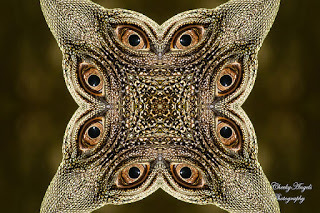 Photo by Cheeky AngelsOne day, in grade ten, a girl came to my desk (which was in a corner at the back of the class) during a break. To my surprise, she started talking to me. She said she dug my style. She was short, with dark hair caught in a ponytail, white skin, a freckled tiny nose and lively hazel eyes. She had a cute, shy smile and small, white, perfectly ordered teeth. I honestly hadn’t noticed her before, although we had been in the same class for two years. Her name was Jessica Anderson. She said that she noticed I was interested in philosophy and was wondering what I thought about truth, real truth; was it inside us or outside of us? I immediately observed that she must have read this somewhere and rehearsed it. Those words seemed alien in her mouth, not covered in the placenta of her understanding. But I didn’t mind it. When I started to express my complicated views about truth, Jessica seemed to be hanging on my every word. It was as if magical, golden bubbles were floating out of my mouth. After school she walked with me to my apartment building and, before I went inside, she kissed me on the cheek, smiled, and blushed. Only later did I find out that the boy was supposed to walk the girl home. In our case, it was the other way around. She would walk me home every day. I enjoyed our conversations mainly because they were ways of talking to myself.
Photo by Cheeky AngelsOne day, in grade ten, a girl came to my desk (which was in a corner at the back of the class) during a break. To my surprise, she started talking to me. She said she dug my style. She was short, with dark hair caught in a ponytail, white skin, a freckled tiny nose and lively hazel eyes. She had a cute, shy smile and small, white, perfectly ordered teeth. I honestly hadn’t noticed her before, although we had been in the same class for two years. Her name was Jessica Anderson. She said that she noticed I was interested in philosophy and was wondering what I thought about truth, real truth; was it inside us or outside of us? I immediately observed that she must have read this somewhere and rehearsed it. Those words seemed alien in her mouth, not covered in the placenta of her understanding. But I didn’t mind it. When I started to express my complicated views about truth, Jessica seemed to be hanging on my every word. It was as if magical, golden bubbles were floating out of my mouth. After school she walked with me to my apartment building and, before I went inside, she kissed me on the cheek, smiled, and blushed. Only later did I find out that the boy was supposed to walk the girl home. In our case, it was the other way around. She would walk me home every day. I enjoyed our conversations mainly because they were ways of talking to myself.One Friday after school I asked her if she wanted ice-cream. She accepted with enthusiasm. It was a hot, sunny day in early June, with summer vacation right around the corner. I bought her a vanilla ice-cream cone and I had a chocolate one. Then we started walking down the main street checking out the shops and studying other couples. At one point she held my hand and I looked at her and smiled. I knew she thought we were boyfriend and girlfriend, but I didn’t feel like saying anything. I noticed her tiny, energetic tongue lick the vanilla-ice and then wet her cherry lips. We sat on a bench in front of a splashing fountain, right across from the town hall. I lit a cigarette. I was already committed to the Hollywood brand. Jessica kept talking about something—I guess maybe her plans for future studies and what most interested her—but I was busy trying to mentally undress the young women walking by in short shorts and revealing tops.
She stopped talking for a bit, looked deeply into my eyes and said “You’re such a good listener, Adrian.”
I nodded. Then I asked her if she fancied going to the cemetery and she accepted immediately. It seemed that she agreed even before understanding the content of the suggestion.
This girl would say yes to anything, I thought to myself.
In the cemetery we checked out many graves and marble crosses, laughing at the overdramatic epitaphs and the pictures people put on them. Near the cemetery was a long, green dyke and the Nelson River was flowing in the valley right behind it. There was a soft breeze in the air and the fresh smell of grass and wildflowers was overpowering. Jessica picked up a few dandelions and blew the puffy seeds in my face laughing and ran away towards the water. I closed my eyes and smiled, white seeds caressing my skin.
“Oh, I’ll get you for this!” I warned and began to chase her.
The stream was high and turbid, moving slowly like a lazy, green snake. It slithered through the plains and, eighty miles east it cut Edville in half. We walked up the dyke and ran down the river valley. We sat down on the grass by the river’s bank and started making out. I felt her icy, small tongue curiously probing my mouth and I grew hard. She began caressing me through my jeans. Next, she unzipped them and started stroking with delicate, nervous fingers. Instinctively, I pressed down on her shoulder. Understanding my desire, she went down on me, icy lips with small teeth wrapping me timidly. Her hands went to my hips.
“No hands,” I said. “Don’t touch me with your hands!”
She put her hands behind her back obediently and started bobbing her head up and down with no support. She was moving slowly but surely, determined to please me. Soon I started to feel strange, raped and humiliated, and I asked her to stop. I put my hand on her shoulder and stood up.
“Open your mouth and close your eyes!” I asked.
She did.
She sat on her knees, hands on her lap, her mouth round, waiting patiently. Her eyes were closed, moving in anticipation under her eyelids. After some time I released my dense, white jet into her mouth and she choked and smiled at me with teary, hazel eyes. White semen dripped down her chin.
“I think I swallowed some,” she said. “Ew, it’s so salty!”
I didn’t reply.
I just pulled up my pants in a hurry and walked away, leaving her there. She whispered my name weakly but I didn’t answer. I just wanted to go home and read something, probably something by Dostoyevsky. I felt empty and angry at myself. I was dirty and spiritually confused.
“Adrian!” she called after me again. But she knew it was in vain—she’d had it coming. The resignation strangled her voice. From now on Jessica would live outside my world, on the fringes of my narrative, always looking for an opening in the text, always pushed away by the typewriter’s keys, like a homeless person thrown into the streets by the doorman of a luxury hotel. Jessica would become just a picture in the cemetery of my memory, a picture of a girl waiting with her mouth wide open and her eyes shut.
What happened to her, you may rightly ask? I really don’t know. But maybe this is what happened: Jessica got pregnant on that day, but somehow she got pregnant in the head. She began wandering around the river bank and eating grass and hunting stray dogs. Her head started getting bigger and throbbing with new life. One day, while sitting in the shadow of a tree by the water, her head exploded. Blood sprayed on the green leaves and on the ground. A lizard then crawled out of her ruined skull and quickly climbed into the tree and walked on one of the branches. When it got close to the stream it stopped, strongly hugging the branch. The lizard stood still like that looking at the river with rigid eyes. After many days, round eyes without eyelids asked the water: “Are you my father? Are you my mother? Are you my parents?” The river murmured in reply: “No, we are neither your father nor mother nor your parents for you are no lizard but you are God and God has no parents.”
As you might have guessed, I never had any real friends. This is due mainly to the fact that I was healthy. The way I see it, the need for friends and company is a disease and terrible weakness. Of course, I’d call Nietzsche, Heidegger and Dostoyevsky my friends, in a sense. Sure, they were my favorite companions, and so were the girls in the Playboy magazines and the actresses playing in the pornos I devoured. But calling them friends was a stretch. I just disliked the presence of others in my own space—their faces, their voices, their gestures, clothes, and smells. I despised everything about them, but especially their eyes. What I saw in other people’s eyes made me sick, my stomach squeezed by the claws of disgust. That’s why I’d normally avoid eye contact. When talking to someone I’d either look up over their head, or down, studying the tops of my shoes. I’d focus on my train of thought and do my best to protect my wondering, untainted attention from their verbalizing.
—
"Ich Will" is available through Wolf on Water Print!
Published on March 28, 2013 15:57
February 20, 2013
Emil Cioran's Criticism of Work (stage setting)
Is work intrinsically bad? Are certain jobs dehumanizing? What type of work are we supposed to do if we are to stay true to ourselves and our human nature?
In the section "Degradation Through Work" (reproduced below) of his book On the Heights of Despair , Romanian existentialist philosopher Emil Cioran makes the point that work is essentially degrading because it engages man in the external reality and trumps the spiritual impulses pertaining to his genuine interiority.
In the following I take some preliminary steps toward placing Cioran's remarks in the broader context of philosophical thinking about work, human nature and society.
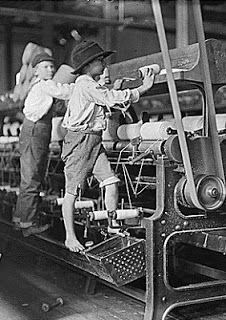 Picture by
Lewis Hine
Karl Marx famously argued that the capitalist economic system leads to
alienated or estranged labor
. The worker losses his humanity and becomes increasingly contaminated by the mechanical or bureaucratic features of the production system he is part of. To illustrate, consider a Filipino worker preparing sandwiches in her sleep, her eyes moving frantically under her eyelids, her lips repeating the menu. Or the Chinese workers manufacturing shoes for Nike while weighing the pros and cons of suicide. (For those who enjoy horror fiction, I recommend reading Marx's description of alienated labor. It's more terrifying than most zombie novels out there! In fact, most horror fiction nowadays is horrific in precisely this sense: it exemplifies the zombification of the artist's imagination in a capitalist economy.) Following Aristotle and Hegel, Marx conceives of man as a social and rational animal who is naturally inclined toward participating in communal, coordinated work in support of the public good. However, Marx argues, the capitalist system distorts that natural tendency and turns man himself into a commodity.
Picture by
Lewis Hine
Karl Marx famously argued that the capitalist economic system leads to
alienated or estranged labor
. The worker losses his humanity and becomes increasingly contaminated by the mechanical or bureaucratic features of the production system he is part of. To illustrate, consider a Filipino worker preparing sandwiches in her sleep, her eyes moving frantically under her eyelids, her lips repeating the menu. Or the Chinese workers manufacturing shoes for Nike while weighing the pros and cons of suicide. (For those who enjoy horror fiction, I recommend reading Marx's description of alienated labor. It's more terrifying than most zombie novels out there! In fact, most horror fiction nowadays is horrific in precisely this sense: it exemplifies the zombification of the artist's imagination in a capitalist economy.) Following Aristotle and Hegel, Marx conceives of man as a social and rational animal who is naturally inclined toward participating in communal, coordinated work in support of the public good. However, Marx argues, the capitalist system distorts that natural tendency and turns man himself into a commodity.
In contrast to Marx, Emil Cioran's criticism of work is much broader. Cioran rejects the thesis that man is a rational animal and considers man essentially as a spiritual being, an insomniac animal capable of understanding and reflecting in his consciousness the deep mystery of the world, the inner tensions and contradictions of the universe. Man is capable of transcending time into eternity and transfiguring himself into God — be it a dead God, an undead God, or a bored God tired of its own lucidity and prone to bouts of sadomasochism. Since work, on Cioran's view, signifies an engagement with external reality as opposed to a spiritual exercise, it follows that work leads to the repression of man's essential nature. But, as opposed to Marx, this is true for both capitalism and communism and each and every social and economic system which doesn't appreciate man's spiritual destiny.
But, someone might object, not all work is concerned with the external world. For instance, writing a novel is work, but it also has the spiritual aspect Cioran talks about. I think there is something to this objection and the scope of Cioran's criticism must be clarified. We need to distinguish between different types of work, the complex ways they are connected to the external world, and what kind of objects they produce. However, in Cioran's defense, it's important to emphasize that the commercialization of fiction and art in general turns interiority itself into a commodity. So, then, in a deep sense, interiority itself becomes external. Based on this insight, it's interesting and worthwhile to work out clearly the way contemporary western culture distorts the notion of soul or inner-self. I think one important criterion to be used in discerning authentic interiority is the artist's own expression of the intention animating their work. For instance, a horror writer might say that he just wants to scare people. In his case, his interiority is filtered through an external grid. A different artist might say that his work is a record of his conversations with God. Or, someone might use art as a way of working through obsessions which haunt them. In this latter cases, interiority appears to be genuine, uncorrupted by the external world. Of course, there is always the problem of self-deception; artists who aim for commercial success but immediately repress this desire into the tunnels of their unconscious.
This issue aside, a different objection to Cioran is that a society in which everyone is focused on their spiritual life will lead to self-destruction because no one will actually do anything. Who will then produce food, build houses or make cars? After all, man needs to adapt to the world if he is to survive. Given his megalomanic nihilism, Cioran will probably observe humanity's self-destruction with delight and even admiration for its romantic heroism. But, for those of us concerned about the future of our species this is an important objection. However, I think that especially in the western culture people are confused about their needs. And this confusion is a product of capitalism, which works best when it manipulates peoples' desires by creating false needs. We think we need a bunch of stuff in order to survive, but we don't. And the belief that acquiring a lot of stuff leads to better lives is a product of capitalist indoctrination.
Moreover, a focus on interiority may give rise to a renewed concern for the world, for our community values and traditions. This is one of the important points Heidegger makes in Being and Time and is further developed by Charles Taylor in The Ethics of Authenticity. Simply put, an individual's spiritual development may naturally give rise to a concern in the spiritual development of others. So coordinated communal efforts which lead to meeting the community's members basic needs for food and shelter in order to create the conditions of possibility for their spiritual journeys, are not excluded by Cioran's ideas, but, on some interpretations, naturally flow from them.
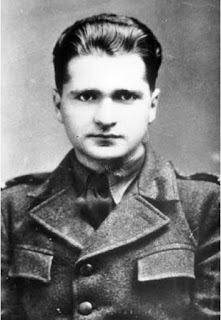 This being said, let's read carefully through young Cioran's short and striking remarks about work. As indicated, this section appears in his first book On the Heights of Despair, a book he published at the tender age of 22, when he was already an 'expert in the problem of death.'
This being said, let's read carefully through young Cioran's short and striking remarks about work. As indicated, this section appears in his first book On the Heights of Despair, a book he published at the tender age of 22, when he was already an 'expert in the problem of death.'
Degradation Through Work
"Men generally work too much to be themselves. Work is a curse which man has turned into pleasure. To work for work’s sake, to enjoy a fruitless endeavor, to imagine that you can fulfill yourself through assiduous labor—all that is disgusting and incomprehensible. Permanent and uninterrupted work dulls, trivializes, and depersonalizes.
Where have they all gone; ecstasy, vision, exaltation? Where is the supreme madness or the genuine pleasure of evil? The negative pleasure one finds in work partakes of the poverty and banality of daily life, its pettiness. Why not abandon this futile work and begin anew without repeating the same wasteful mistake? Is subjective consciousness of eternity not enough? It is the feeling for eternity that the frenetic activity and trepidation of work has destroyed in us. Work is the negation of eternity. The more goods we acquire in the temporal realm, the more intense our external work, the less accessible and farther removed is eternity. Hence the limited perspective of active and energetic people, the banality of their thought and actions. I am not contrasting work to either passive contemplation or vague dreaminess, but to an unrealizable transfiguration; nevertheless, I prefer an intelligent and observant laziness to intolerable, terrorizing activity. To awaken the modern world, one must praise laziness. The lazy man has an infinitely keener perception of metaphysical reality than the active one."
Emil Cioran, On the Heights of Despair, University of Chicago Press, 1992.
In the section "Degradation Through Work" (reproduced below) of his book On the Heights of Despair , Romanian existentialist philosopher Emil Cioran makes the point that work is essentially degrading because it engages man in the external reality and trumps the spiritual impulses pertaining to his genuine interiority.
In the following I take some preliminary steps toward placing Cioran's remarks in the broader context of philosophical thinking about work, human nature and society.
 Picture by
Lewis Hine
Karl Marx famously argued that the capitalist economic system leads to
alienated or estranged labor
. The worker losses his humanity and becomes increasingly contaminated by the mechanical or bureaucratic features of the production system he is part of. To illustrate, consider a Filipino worker preparing sandwiches in her sleep, her eyes moving frantically under her eyelids, her lips repeating the menu. Or the Chinese workers manufacturing shoes for Nike while weighing the pros and cons of suicide. (For those who enjoy horror fiction, I recommend reading Marx's description of alienated labor. It's more terrifying than most zombie novels out there! In fact, most horror fiction nowadays is horrific in precisely this sense: it exemplifies the zombification of the artist's imagination in a capitalist economy.) Following Aristotle and Hegel, Marx conceives of man as a social and rational animal who is naturally inclined toward participating in communal, coordinated work in support of the public good. However, Marx argues, the capitalist system distorts that natural tendency and turns man himself into a commodity.
Picture by
Lewis Hine
Karl Marx famously argued that the capitalist economic system leads to
alienated or estranged labor
. The worker losses his humanity and becomes increasingly contaminated by the mechanical or bureaucratic features of the production system he is part of. To illustrate, consider a Filipino worker preparing sandwiches in her sleep, her eyes moving frantically under her eyelids, her lips repeating the menu. Or the Chinese workers manufacturing shoes for Nike while weighing the pros and cons of suicide. (For those who enjoy horror fiction, I recommend reading Marx's description of alienated labor. It's more terrifying than most zombie novels out there! In fact, most horror fiction nowadays is horrific in precisely this sense: it exemplifies the zombification of the artist's imagination in a capitalist economy.) Following Aristotle and Hegel, Marx conceives of man as a social and rational animal who is naturally inclined toward participating in communal, coordinated work in support of the public good. However, Marx argues, the capitalist system distorts that natural tendency and turns man himself into a commodity. In contrast to Marx, Emil Cioran's criticism of work is much broader. Cioran rejects the thesis that man is a rational animal and considers man essentially as a spiritual being, an insomniac animal capable of understanding and reflecting in his consciousness the deep mystery of the world, the inner tensions and contradictions of the universe. Man is capable of transcending time into eternity and transfiguring himself into God — be it a dead God, an undead God, or a bored God tired of its own lucidity and prone to bouts of sadomasochism. Since work, on Cioran's view, signifies an engagement with external reality as opposed to a spiritual exercise, it follows that work leads to the repression of man's essential nature. But, as opposed to Marx, this is true for both capitalism and communism and each and every social and economic system which doesn't appreciate man's spiritual destiny.
But, someone might object, not all work is concerned with the external world. For instance, writing a novel is work, but it also has the spiritual aspect Cioran talks about. I think there is something to this objection and the scope of Cioran's criticism must be clarified. We need to distinguish between different types of work, the complex ways they are connected to the external world, and what kind of objects they produce. However, in Cioran's defense, it's important to emphasize that the commercialization of fiction and art in general turns interiority itself into a commodity. So, then, in a deep sense, interiority itself becomes external. Based on this insight, it's interesting and worthwhile to work out clearly the way contemporary western culture distorts the notion of soul or inner-self. I think one important criterion to be used in discerning authentic interiority is the artist's own expression of the intention animating their work. For instance, a horror writer might say that he just wants to scare people. In his case, his interiority is filtered through an external grid. A different artist might say that his work is a record of his conversations with God. Or, someone might use art as a way of working through obsessions which haunt them. In this latter cases, interiority appears to be genuine, uncorrupted by the external world. Of course, there is always the problem of self-deception; artists who aim for commercial success but immediately repress this desire into the tunnels of their unconscious.
This issue aside, a different objection to Cioran is that a society in which everyone is focused on their spiritual life will lead to self-destruction because no one will actually do anything. Who will then produce food, build houses or make cars? After all, man needs to adapt to the world if he is to survive. Given his megalomanic nihilism, Cioran will probably observe humanity's self-destruction with delight and even admiration for its romantic heroism. But, for those of us concerned about the future of our species this is an important objection. However, I think that especially in the western culture people are confused about their needs. And this confusion is a product of capitalism, which works best when it manipulates peoples' desires by creating false needs. We think we need a bunch of stuff in order to survive, but we don't. And the belief that acquiring a lot of stuff leads to better lives is a product of capitalist indoctrination.
Moreover, a focus on interiority may give rise to a renewed concern for the world, for our community values and traditions. This is one of the important points Heidegger makes in Being and Time and is further developed by Charles Taylor in The Ethics of Authenticity. Simply put, an individual's spiritual development may naturally give rise to a concern in the spiritual development of others. So coordinated communal efforts which lead to meeting the community's members basic needs for food and shelter in order to create the conditions of possibility for their spiritual journeys, are not excluded by Cioran's ideas, but, on some interpretations, naturally flow from them.
 This being said, let's read carefully through young Cioran's short and striking remarks about work. As indicated, this section appears in his first book On the Heights of Despair, a book he published at the tender age of 22, when he was already an 'expert in the problem of death.'
This being said, let's read carefully through young Cioran's short and striking remarks about work. As indicated, this section appears in his first book On the Heights of Despair, a book he published at the tender age of 22, when he was already an 'expert in the problem of death.'Degradation Through Work
"Men generally work too much to be themselves. Work is a curse which man has turned into pleasure. To work for work’s sake, to enjoy a fruitless endeavor, to imagine that you can fulfill yourself through assiduous labor—all that is disgusting and incomprehensible. Permanent and uninterrupted work dulls, trivializes, and depersonalizes.
Where have they all gone; ecstasy, vision, exaltation? Where is the supreme madness or the genuine pleasure of evil? The negative pleasure one finds in work partakes of the poverty and banality of daily life, its pettiness. Why not abandon this futile work and begin anew without repeating the same wasteful mistake? Is subjective consciousness of eternity not enough? It is the feeling for eternity that the frenetic activity and trepidation of work has destroyed in us. Work is the negation of eternity. The more goods we acquire in the temporal realm, the more intense our external work, the less accessible and farther removed is eternity. Hence the limited perspective of active and energetic people, the banality of their thought and actions. I am not contrasting work to either passive contemplation or vague dreaminess, but to an unrealizable transfiguration; nevertheless, I prefer an intelligent and observant laziness to intolerable, terrorizing activity. To awaken the modern world, one must praise laziness. The lazy man has an infinitely keener perception of metaphysical reality than the active one."
Emil Cioran, On the Heights of Despair, University of Chicago Press, 1992.
Published on February 20, 2013 12:39
February 8, 2013
The Playground with Crosses (very short story)
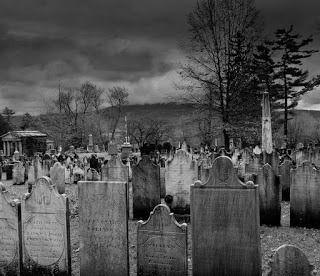 Photo by John DiLeo
Photo by John DiLeoThe crypt was cold; it smelled of cement and candles. I couldn't squeeze hugs from the rigid, dry hands. Through the iron bars of the window I crawled outside and wandered around on wobbly legs.
I used to eat weeds and suck the cold milk of marble crosses. After a day of wandering around, in the evening, I would go back to the crypt. I slept huddled up on a multicolored dusty rug with tassels, laid on the bare cement, close to the dead.
One day, while hugging a cross with all my strength, I glimpsed a dog in the corner of my eye. His hungry yellow eyes measured me. His brown fur was rumpled, filled with thistles. He snarled and jumped at me savagely. I fell on my back, teeth piercing brutally through my right arm. I saw crows flying like screams in the clear blue sky. The cur chewed and ripped, growling and shaking his head. As it pulled my arm out of its socket, I slid into darkness.
I woke up after some time. Through a veil of tears I saw a bitch with saggy tits and purple nipples, crusts of bread on the ground, and women kneeling down and wailing. They were dressed in black, long hair covering their faces. I ate some funeral wheat porridge with my left hand and licked my fingers. In the back of the chapel I found a black dusty coat and a pair of old, muddy shoes. I put on the coat and buttoned it up slowly. It smelled like a corpse. The shoes were big, heavy and rough. I decided to walk barefoot.
I remember the day when a grown-up handed me a sack with something round and solid inside. He taught me how to kick the sack with my right foot. After he left I played with it for a while. I would kick it and it would roll on the grass in front on me. Then the sack started bleeding; it left traces of blood in the dusty green of the grass. I lifted and opened it. There was a woman’s head inside. Her rumpled dark hair was filled with clotted, sticky blood. I washed her at the water pump and took her in my crypt. The shape of her face was prominent and she still had some skin on her ruined cheeks. Her eyes were deep wounds, two springs of blood. In the evenings I would kiss her decaying lips and fall asleep with her in my arms.
Then it started raining for a long time. The crypt was humid and cold. Worms infested the head and I had to throw it out. I was so lonely and bored that I didn't even know whether I was still alive. Finally, the sun pushed through the clouds and I began wandering again. I spoke silently with my neighbors hiding under crosses, and caressed their oval sepia pictures with my pale fingers. One day, as I was kicking an empty beer can down the cemented path in the middle of the cemetery, I stumbled and fell down in a puddle. In the trembling muddy water I saw myself for the first time. My hair was dirty and ruffled and the corners of my mouth were turned down, like the mouth of a mourner. My eyes were vacant like the windows of a deserted house; two long shadows grew under them, the open wings of a bat. My wrinkles were deep as if drawn with a razor. The bones of my face were pronounced behind the rugged skin. I thought that if I carelessly fell asleep in an open casket no one would believe I was still alive, that my heart still struggled in my chest.
While I was staring at my watery reflection, the wind started blowing and my face trembled and decomposed into small ripples. The nervous wails of wooden crosses accompanied the rusty, rhythmic moans of the metallic cemetery gates. Funeral wreaths rustled like flapping, broken wings. Pushed from behind by a gust of wind I started running down the alley toward the chapel. Then I felt I’m not touching the ground with my feet anymore. In an instant I rose over the earth. I looked down and saw the muddy puddles move rapidly away. The branches of the trees lining the alley quivered in the wind.
I was flying!
I started shouting and crying with joy!
I lifted my hand, stroked the wild wind and greeted the infinite skies. In response, the next gust lifted me even higher. I looked down at the cemetery and then up toward the ocean of leaden clouds. I was floating chaotically, my coat undulating in the wind, my legs pedaling through the air. Exhilarated, I closed my eyes and felt I was smiling. Painfully, the corners of my mouth moved up, my lips revealing ruined teeth. The velvet clouds caressed my wounded face, touches I had always dreamed of. Like happiness, the embrace lasted only a moment. When I opened my eyes I saw the grey cement coming toward me at enormous speed. It punched me like a concrete fist. My skull cracked. It sounded like a putrefied cross. Down a gutter of fresh blood, I slid into darkness.
Published on February 08, 2013 13:28
February 4, 2013
4 Dark Poems
Her Portrait in Darkness
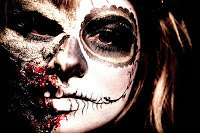 Pic from imgfave.com
Pic from imgfave.comThe wind of oblivion is blowing in the cemetery.Dust covers your playful smile;It caresses the bleak joy in your dreamy eyes.There is still a glare of hope in them;Food for the maggots. An eventless eternity is waiting for you, darling,No room for dancing in the grave.You are blurred memories in my feeble mind now,Neurons dissolving in a bottle of wine.Our happiness — a desecrated grave,A braindead child Smiling at the abyss.Us — two actors in a coffinPlaying with the masks of despair.
Decomposing in Tears
The old woman hurried to the same placeHer shoulders hunched upAs if God himself pressed his boot on her backLike a driver pushing the accelerator.Her brain was bleeding.Black, crying eyes rolled on the sidewalk.When she lit the cigarette Death slapped her wrinkled faceThe abyss filled her mouth with sandAnd she smiled like a retarded child From out of nothing.
Feeling like she was behind life and death,She buried herself in the gardenBut no one noticed her absenceAnd she began crying and screaming in her unknown grave Like a child in his mom’s womb.
After tasting the sand in her mouth for a while,She shoved her knotty trembling hands in her headAnd threw black and white memories chaotically around her;Tea parties, she used to be so coquettish and sophisticated,But her youth shrunk into a bitter maskDecomposing in tears.
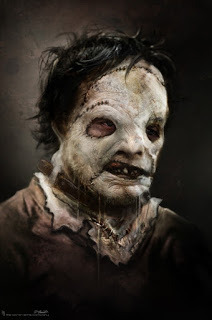 Dog Days
Dog DaysI am sorry, Mom, for smashing your face with my winter bootsAnd skating on your humid brains spread on the floor.These dog days melted my mind.But I have to tell youI don't feel so good,I think I have a headache,and I'm not very happy.Give me a hug!
Dad, I don't know what came over me But it seems that I hung your intestines in the window,There was too much light in the room, you see,The sun ruined my privacy.Why did I throw your head in the toilet?Why did I stick your heart in the garbage?What was I thinking?I'm not sure if I adorned the apple tree in front of the housewith your limbs.It's not Christmas yet.
Sis, it seems that I will sleep in your warm blood tonight,Dream of our happy childhood,Our first visit to the cemetery; our mother's womb.Remember?
Darling, I must say,Even dead, you look like a doll more than ever.A dream seems to float before your beautiful eyes.Do they play a movie on the wall?What is it?Tell me, please, tell me!Look at me when I am talking to you!
Spring at the Slaughterhouse
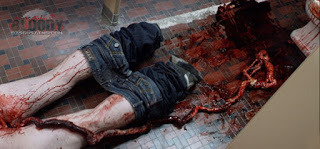 Cutting the umbilical cord connecting me to my dead bodyhas led to full paralysis.
Cutting the umbilical cord connecting me to my dead bodyhas led to full paralysis. Red, pulsating dreams are no longer growingin empty parking lots.
Muddy memories of pale children, old stories, and dusty music records,float through my mind like sepia toned pictures.
I talk from time to time to the other patients.Their words mingle in my brain,dripping down my temples like sweat.
Once, the phone in our room started ringing and we looked at each other.No one could pick it up. After a while a nurse came and answered it."It's for you." she said, looking at me.
She placed the receiver next to my ear.
A familiar voice said: "Spring has come to the slaughterhouse! Animals blossom!"
My ear bled,as the receiver penetrated meand the feeding resumed.
Published on February 04, 2013 12:15
February 3, 2013
On Masters and Slaves
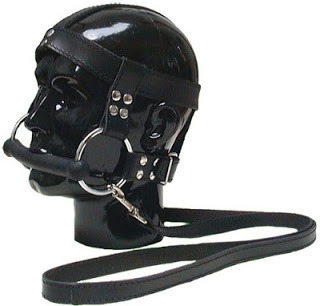
There are two kinds of slaves: perfect slaves and imperfect ones. The perfect slaves have no consciousness because they were born with no power or lucidity; their birth is like that of a hammer or a screwdriver. Imperfect slaves realize that they live in a world that isn't the creation of their will, they feel deeply alienated and abused, but they don't have the vitality or pathos to do anything about it, to reclaim their world.
Authentic people or masters are the ones for whom alienation is unbearable, they are the ones who feel the deep violence that lies beneath everything that others take for granted, of everything banal and mundane. As a result, they have to take charge of their lives and create their living space. Fulfilling this obligation lies in their noble nature. This is why there is a difference in kind between being a master and being a slave. Because slaves, both perfect and imperfect ones, find alienation bearable, only mildly uncomfortable. On the other hand, aristocrats can't take being pushed around, can't take the constant rape, because banality violates their essential being, the origin of their meaning.
Suicide is always on the master's mind, as an authentic possibility. However, he doesn't put it in practice out of an instinct of self-annihilation, like the slave, but, paradoxically, out of an instinct of self-affirmation. The lucid act is a bright flare shot into the dark, illuminating the trajectory of his will, the front line of his war.
The powerful and the weak react differently to aggression. This reaction denotes how much energy they are willing to put into fighting the aggressor. The powerful man’s immediate response shows his conviction that he can prevail, whereas the weak man’s timidity expresses lack of vitality. The aristocrat's temporary retreat, when it occurs, doesn't signal weakness, but the preparation for total war.
While perfect slaves are like a sterile woman’s ruined womb, imperfect slaves resemble mobile graves. They carry inside them children who still breathe, but are forced to play dead; kids with their lips sewn together with the threads of idle chatter, only able to utter a zombified, constant moan. Imperfect slaves live while listening to a dying song whose rhythm projects them in the realm of an aborted freedom, a faded memory of a brain devoured by dementia The sound comes from a coffin; it is the call of insects and worms, the cheep of a chick unable to hatch its egg. Thus, for defective slaves, the space of freedom becomes the space of torture and deep, barely repressed, anxiety. This is why, the imperfect slave stuffs earplugs in his ears and tries to imitate his brother, the perfect slave, by covering himself with the multicolored blanket of obedience.
Published on February 03, 2013 11:27

